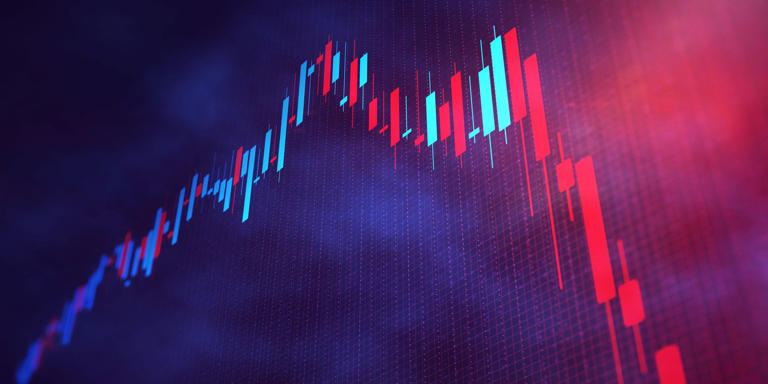Key Takeaways:
- Paul Dietrich, chief investment strategist of B. Riley, predicts a recession in 2024.
- Even a mild recession could lead to a substantial stock market crash, potentially reaching up to 40%.
- Dietrich highlights that the market is currently experiencing levels of overvaluation reminiscent of the dot-com bubble of 2001.
According to Paul Dietrich, the chief investment strategist of B. Riley Wealth, a recession is likely to occur in 2024. Despite the recent record highs in the US stock market, fueled in part by optimistic earnings reports such as Nvidia’s, Dietrich warns that the market is currently experiencing levels of overvaluation not seen in over twenty years.
Dietrich predicts that even a mild economic slowdown could have significant repercussions for stocks. In his view, the higher stocks climb during the bull market, the greater the potential fall during a recession. He suggests that a modest downturn could lead to a stock market crash of up to 40%, bringing the S&P 500 index down to around 3,000 points.
Expressing his concerns, Dietrich emphasizes that the current market conditions are indicative of an impending recession, regardless of short-term economic indicators. He believes that the market is severely overvalued, which raises the risk of a significant correction in stock prices.
The prevailing sentiment on Wall Street reflects high optimism, driven by expectations of substantial interest rate cuts and unabated enthusiasm for artificial intelligence (AI) investments. Investors are pricing in significant rate reductions by the Federal Reserve, with forecasts indicating around 100 basis points of cuts, as indicated by the CME FedWatch tool. Despite this, the economy has demonstrated unexpected resilience, with Atlanta Fed economists estimating growth to hover around 2.9% for the current quarter.
However, beneath the surface, there are indications that paint a less optimistic picture of the economy. Chief Investment Strategist Dietrich has cautioned against overlooking concerning trends, highlighting several economic indicators that have plunged into what he describes as “deep recession territory.” Specifically, he points to weaknesses in the job market and consumer spending as areas of concern.
Although the unemployment rate remains historically low, there are challenges for job seekers in securing employment. Dietrich notes that continuing unemployment claims have remained stubbornly high, hovering around 1.9 million since the beginning of 2024. He interprets this level as indicative of a “recessionary” environment, suggesting ongoing difficulties for individuals seeking reemployment opportunities.
Consumers are facing challenges in keeping up with the pace of inflation and rising borrowing costs, as evidenced by record credit card debt totaling $1.13 trillion in the fourth quarter, according to Fed data. Chief Investment Strategist Dietrich has cautioned that consumers may soon reach their credit limits, potentially slowing down an important engine of the economy in the past year.
Moreover, Dietrich predicts that inflation is unlikely to return to the Federal Reserve’s 2% target anytime soon. Despite a significant cooling of prices from their 2022 highs, the substantial injection of money into the economy during the pandemic—approximately $2 trillion since President Biden’s term began—has yet to fully manifest its inflationary effects.
Dietrich highlights the time lag between government spending and its impact on inflation, estimating it takes about two years for inflation to catch up. He warns that reaching the target of 2% inflation could be challenging and slow, potentially leading to a stagflation scenario reminiscent of the 1970s, where prices surged amid sluggish economic growth.
Historically, recessions have not translated to smooth sailing for stock investors. Even during mild economic downturns like the 2001 recession, where GDP barely dipped, stocks experienced significant declines. The Nasdaq Composite, particularly overvalued at the time, plummeted 78% from its peak. Dietrich suggests that given the current market conditions, stocks could face even steeper declines, especially considering their heightened overvaluation since 2001.
Dietrich believes that the current stock market surge is primarily fueled by the strength of seven mega-cap tech stocks and speculation around potential Fed rate cuts. However, he warns that this enthusiasm overlooks the cooling economy and the inherent risks. New York Fed economists estimate a 61% chance of a recession by January of the following year, while an under-the-radar economic indicator places the odds of recession at 85%, the highest since the Great Financial Crisis.
